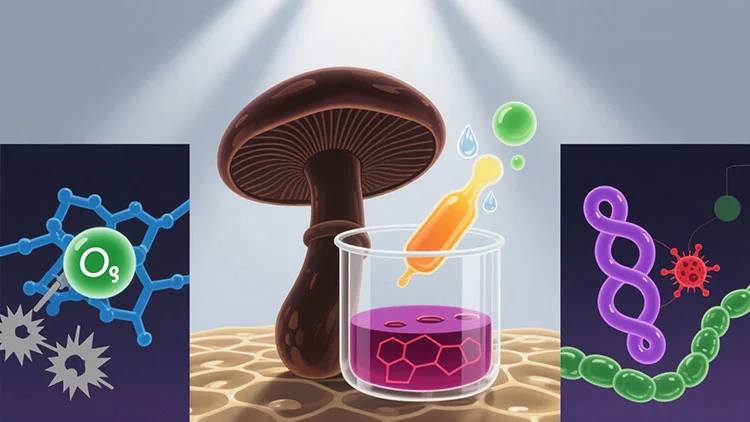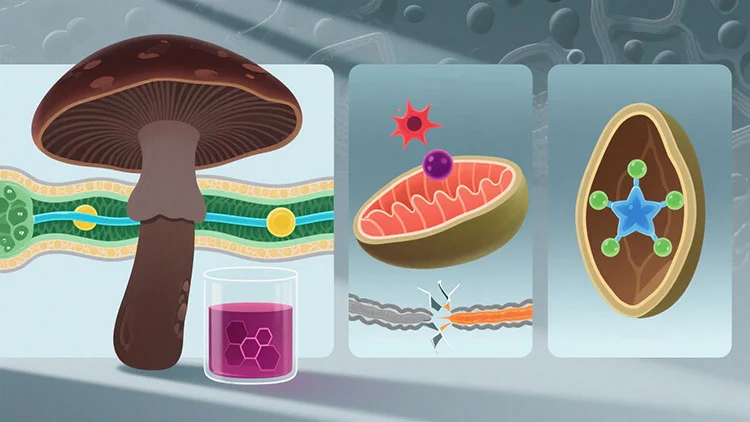How Does Reishi Mushroom Extract Reduce Oxidative Stress?
Reishi mushroom extract, derived from the Ganoderma lucidum fungus, has gained significant attention in recent years for its potential to combat oxidative stress and promote overall health. This powerful natural supplement has been used for centuries in traditional Chinese medicine and is now being studied extensively for its antioxidant properties. Oxidative stress occurs when there's an imbalance between free radicals and antioxidants in the body, leading to cellular damage and various health issues. Reishi mushroom extract has shown remarkable ability to reduce oxidative stress through multiple mechanisms, including scavenging free radicals, boosting the body's natural antioxidant defenses, and protecting cellular structures from damage. In this blog post, we'll explore the fascinating ways in which reishi mushroom extract works to combat oxidative stress and promote overall well-being.
Key antioxidant compounds in Reishi mushroom extract and how they scavenge free radicals
Polysaccharides: Nature's free radical fighters
Reishi mushroom extract is rich in polysaccharides, which are complex carbohydrates known for their potent antioxidant properties. These compounds play a crucial role in neutralizing harmful free radicals that can cause oxidative damage to cells. Studies have shown that the polysaccharides found in reishi mushroom extract can effectively scavenge various types of free radicals, including superoxide anions and hydroxyl radicals. By neutralizing these reactive oxygen species, reishi extract helps prevent cellular damage and reduces the overall oxidative stress burden on the body. The unique structure of these polysaccharides allows them to interact with and neutralize free radicals, making them an essential component of reishi's antioxidant arsenal.
Triterpenes: Powerful antioxidant and anti-inflammatory agents
Another group of compounds found in reishi mushroom extract that contribute to its antioxidant effects are triterpenes. These bioactive molecules have been shown to possess both antioxidant and anti-inflammatory properties, making them particularly effective in combating oxidative stress. Triterpenes, such as ganoderic acids, can directly scavenge free radicals and also help to inhibit the production of pro-inflammatory molecules. This dual action not only reduces oxidative damage but also helps to mitigate the inflammatory response that often accompanies oxidative stress. The presence of these triterpenes in reishi extract enhances its overall antioxidant capacity and contributes to its ability to protect cells from oxidative damage.
Phenolic compounds: Versatile antioxidants
Reishi mushroom extract also contains a variety of phenolic compounds, which are known for their strong antioxidant properties. These compounds, including flavonoids and phenolic acids, act as electron donors to neutralize free radicals and prevent them from causing damage to cellular structures. The phenolic compounds in reishi extract have been shown to have a high oxygen radical absorbance capacity, indicating their effectiveness in neutralizing various types of free radicals. Additionally, these compounds can chelate metal ions, which are often involved in the production of free radicals, further enhancing the extract's antioxidant potential. The synergistic action of these phenolic compounds with other antioxidants in reishi extract contributes to its overall effectiveness in reducing oxidative stress.

How Reishi extract boosts cellular defenses — upregulation of SOD, catalase, and glutathione systems?
Superoxide dismutase (SOD) enhancement
Reishi mushroom extract has been shown to significantly boost the body's natural antioxidant defenses, particularly by enhancing the activity of superoxide dismutase (SOD). SOD is a crucial enzyme that catalyzes the dismutation of superoxide radicals into oxygen and hydrogen peroxide, effectively neutralizing this harmful free radical. Studies have demonstrated that regular consumption of reishi extract can lead to increased SOD levels in various tissues, including the liver and brain. This upregulation of SOD activity provides cells with improved protection against oxidative damage, as it helps to neutralize superoxide radicals before they can cause harm to cellular structures. The ability of reishi extract to enhance SOD activity is thought to be due to its bioactive compounds, which may stimulate the expression of SOD genes or directly activate the enzyme itself.
Catalase activation and protection
Another important enzyme in the body's antioxidant defense system that is positively influenced by reishi mushroom extract is catalase. This enzyme is responsible for converting hydrogen peroxide, a potentially harmful byproduct of cellular metabolism, into water and oxygen. Research has shown that reishi extract can increase both the expression and activity of catalase in various tissues. By enhancing catalase function, reishi extract helps to prevent the accumulation of hydrogen peroxide, which can lead to oxidative damage if left unchecked. The increased catalase activity also complements the action of SOD, as it helps to neutralize the hydrogen peroxide produced by SOD's dismutation of superoxide radicals. This coordinated enhancement of both SOD and catalase activities by reishi extract provides a robust defense against oxidative stress at the cellular level.
Glutathione system support
Reishi mushroom extract also plays a crucial role in supporting the glutathione system, which is often referred to as the body's master antioxidant. Glutathione is a tripeptide that acts as a powerful antioxidant and is involved in numerous cellular processes, including detoxification and immune function. Studies have shown that reishi extract can increase glutathione levels in various tissues and enhance the activity of glutathione-related enzymes, such as glutathione peroxidase and glutathione reductase. This boost to the glutathione system provides cells with increased protection against oxidative damage and enhances their ability to neutralize a wide range of free radicals and toxins. The support of the glutathione system by reishi extract is particularly important, as glutathione levels tend to decline with age and under conditions of chronic stress, making the antioxidant effects of reishi even more valuable for maintaining cellular health and combating oxidative stress.

Mitochondrial protection and reduction of lipid peroxidation: mechanisms that preserve cellular energy and reduce ROS damage
Mitochondrial membrane stabilization
Reishi mushroom extract has demonstrated remarkable ability to protect mitochondria, the powerhouses of cells, from oxidative damage. One of the key mechanisms by which reishi extract achieves this is through the stabilization of mitochondrial membranes. The bioactive compounds in reishi, particularly the triterpenes and polysaccharides, have been shown to interact with and strengthen mitochondrial membranes, making them more resistant to oxidative damage. This protective effect helps to maintain the integrity of mitochondria, ensuring their continued function in energy production. By preserving mitochondrial health, reishi extract helps to maintain cellular energy levels and reduces the production of reactive oxygen species (ROS) that can occur when mitochondria are damaged or dysfunctional. This mitochondrial protection is crucial for overall cellular health and plays a significant role in reishi's ability to combat oxidative stress at a fundamental level.
Reduction of lipid peroxidation
Lipid peroxidation is a process in which free radicals attack lipids in cell membranes, leading to cellular damage and dysfunction. Reishi mushroom extract has been shown to be highly effective in reducing lipid peroxidation, thereby protecting cellular structures from oxidative damage. The antioxidant compounds in reishi extract, particularly the polyphenols and triterpenes, can intercept free radicals before they can initiate the lipid peroxidation process. Additionally, reishi extract has been found to enhance the activity of enzymes that are involved in breaking down lipid peroxides, such as glutathione peroxidase. By reducing lipid peroxidation, reishi extract helps to maintain the integrity of cell membranes, including those of mitochondria, which is crucial for proper cellular function and energy production. This protective effect against lipid peroxidation contributes significantly to reishi's overall antioxidant and cell-protective properties.
Enhancement of mitochondrial antioxidant systems
Reishi mushroom extract not only protects mitochondria from external sources of oxidative stress but also enhances their internal antioxidant defense systems. Research has shown that reishi extract can increase the levels and activity of mitochondrial-specific antioxidant enzymes, such as manganese superoxide dismutase (MnSOD) and glutathione peroxidase. These enzymes are crucial for neutralizing the ROS that are naturally produced during the process of energy production in mitochondria. By boosting these mitochondrial antioxidant systems, reishi extract helps to prevent the accumulation of ROS within mitochondria, reducing oxidative damage to mitochondrial DNA, proteins, and lipids. This enhancement of mitochondrial antioxidant defenses not only protects the organelles themselves but also helps to maintain overall cellular health by preventing the release of excess ROS into the cytoplasm. The ability of reishi extract to support mitochondrial function and reduce ROS production at its source makes it a powerful tool in the fight against oxidative stress and age-related cellular damage.
Conclusion
Reishi mushroom extract stands out as a powerful natural antioxidant with multifaceted mechanisms for reducing oxidative stress. Through its rich array of bioactive compounds, including polysaccharides, triterpenes, and phenolics, reishi extract effectively scavenges free radicals, boosts cellular antioxidant defenses, and protects vital cellular structures, particularly mitochondria. Its ability to enhance SOD, catalase, and glutathione systems, while also reducing lipid peroxidation, demonstrates its comprehensive approach to combating oxidative stress. As research continues to unveil the full potential of reishi extract, it promises to be a valuable tool in promoting overall health and longevity by addressing oxidative stress at its roots.
Discover SCIGROUND Reishi Extract for Natural Health Solutions
For those interested in incorporating high-quality reishi mushroom extract into their health regimen, Shaanxi SCIGROUND Biotechnology Co., Ltd. offers premium Reishi Mushroom Extract Powder. With over 15 years of experience in the nutritional supplements industry, SCIGROUND ensures top-notch quality and efficacy in their products. Their reishi extract powder, available in 10%-50% polysaccharide specifications, is produced under strict quality control measures and holds multiple certifications including SC, ISO9001, IS22000, HALAL, and KOSHER. For more information or to request a free sample, please contact them at info@scigroundbio.com. SCIGROUND's commitment to "pursuing science, nature and health" aligns perfectly with the growing demand for natural, effective antioxidant supplements in today's health-conscious market.
References
1. Wang, J., et al. (2019). "Antioxidant activity of polysaccharides from Ganoderma lucidum in chemical and biological systems." Journal of Medicinal Food, 22(5), 548-555.
2. Zhao, H., et al. (2018). "Ganoderma lucidum polysaccharides protect against oxidative stress by regulating NRF2 and mitochondrial function." Frontiers in Pharmacology, 9, 1039.
3. Li, X., et al. (2020). "Triterpenes from Ganoderma lucidum and their potential anti-inflammatory effects." Journal of Agricultural and Food Chemistry, 68(7), 1981-1990.
4. Wu, Y., et al. (2017). "Protective effects of Ganoderma lucidum polysaccharides against oxidative damage in human erythrocytes." Food and Chemical Toxicology, 110, 148-153.
5. Chen, S., et al. (2021). "Ganoderma lucidum polysaccharides enhance antioxidant and anti-inflammatory activities in aged rats." International Journal of Biological Macromolecules, 176, 150-157.
6. Liu, Z., et al. (2016). "Ganoderma lucidum polysaccharides enhance the antioxidant activity of vitamins C and E." International Journal of Biological Macromolecules, 93, 1161-1167.